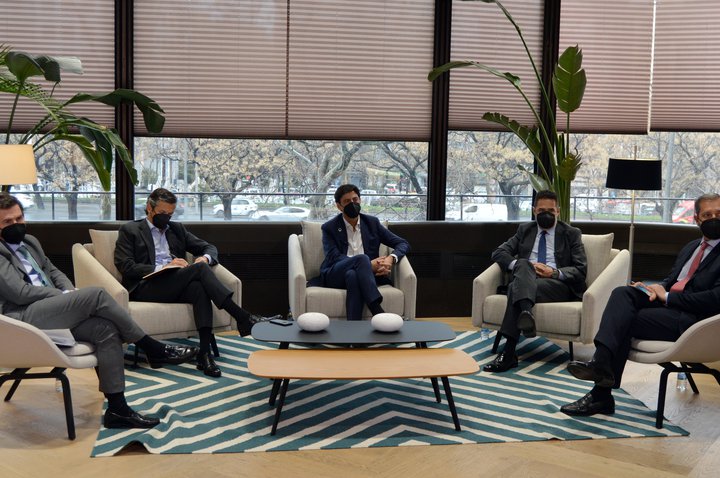Showing the value of building rehabilitation and urban renewal and how to develop a framework of legal and financial security for owners and investors are necessary elements to promote the rehabilitation sector in Spain both in the short and long term. These are some of the main conclusions of Rehabilitation, a debate organized by the Observatory 2030 of the Higher Council of the College of Architects of Spain (CSCAE) and Savills Aguirre Newman, which took place at the headquarters of the real estate consultancy in Madrid.
The meeting was moderated by Ángela Baldellou, director of the CSCAE 2030 Observatory, and had the participation of different representatives of the real estate industry, the economic and legal field, such as Juan Pérez Hereza, of the General Council of Notaries; Fernando de Roda, CEO, founder and managing partner of Greenward Partners; Javier Martín, general director of Housing and Land of the Ministry of Transport, Mobility and Urban Agenda; Juan Antonio Gómez-Pintado, president of APC España; Juan Carlos Delrieu, Director of Strategy and Sustainability of the Spanish Banking Association (AEB); Valentí Pich, president of the General Council of Economists of Spain; Joan Clos, president of ASVAL; Alejandro Pestaña, representing the General Council of Property Administrators; Dolores Huerta, general director of GBC España; Julián Núñez, president of SEOPAN, and Susana Cabrera, responsible for Investments of Azora.
For the president of the CSCAE, Lluís Comerón, the Covid19 pandemic has faced our generation with great challenges, such as the environment, and he has considered it essential to promote a “deep renovation” of our cities so that our country can definitively rise to the 21st century. «In Spain, we start from a very low renovation rate due to the lack of maintenance culture in our buildings and the dispersion of ownership, which makes decision-making difficult. To guarantee the efficiency of the EU recovery funds, it is necessary to identify the barriers that have hindered the development of the rehabilitation and work to remove them in a coordinated effort between the administrations and the building sector ».
Likewise, Jaime Pascual-Sanchiz, CEO of Savills Aguirre Newman, has pointed out that «the aspirations and motivations of today's society are much more global and cross-cutting than a few years ago and share some objectives such as curbing climate change and improving well-being». For all these reasons, he has emphasized, «from Savills Aguirre Newman, our determination is to continue supporting initiatives in the field of sustainability and energy efficiency in the real estate sector and to help our clients obtain the necessary financing to comply with what society demands of us as sector».
The conference served to expose the fourteen proposals drawn from the CSCAE 2030 Observatory work table, which has some of the most relevant actors in the real estate and construction and building sectors in Spain. All of them are focused on responding to the emergency scenario in which the rehabilitation sector is in the country and taking advantage of the momentum offered by the possibility of accessing European funds for sustainable financing.
Proposals:
• Establish a regulation that favors green credit for the financing of the renovation of buildings with eco-efficient criteria. To do this, it will be necessary to promote works to improve the energy efficiency of buildings and favor decision-making by owners, as well as access to financing.
• Modify the Horizontal Property Law, also to improve and facilitate agreements regarding reforms and improvements in communities with more than one owner.
• Promote and improve the PACE (loan for the activation of ecological capital), helping the asset itself to generate value by itself thanks to the improvements undertaken and thus avoiding the use of public resources to finance these projects.
• Modify the law on local estates to allow private capital to contribute to financing the 40,000 million euros needed for the rehabilitation included in the PNIEC.
• Encourage, increase endowment and promote existing public tools, such as the State Housing Plan, the PREE Program, ICO loans or regional and municipal financing.
• Encourage and promote private management tools, such as private rehabilitation investment funds and bank loans for such purposes, as well as green mortgages and energy service companies (ESEs).
• Encourage, increase and promote public-private management tools, promoting initiatives such as EuroPACE or HousEEnvest.
• Learn, study and analyze the impact on the Spanish market of other benchmarks in Europe and promote work tables and permanent forums such as AÚNA or the Ecobonus and Superbonus 110% projects.
• Set criteria based on European taxonomy to have clear and established rules, without the need to create unique models for Spain.
• Create a sandbox to assess what regulatory modifications should be made before scaling these products on the market, as it is already doing in the Ministry for the Ecological Transition and the Demographic Challenge with other sectors such as Banking.
• Promote access to bank financing with reduced conditions for energy rehabilitation projects in order to help start these projects.
• Implement a duly approved billing system for energy savings that allows to see and understand easily and quickly the value of the rehabilitation of buildings.
• Facilitate, through planning, the use of urban capital gains due to increases in building and occupancy, as established in the Urban Rehabilitation, Regeneration and Renovation Law.
• Support from the sector to the ERESEE 2020 (Long-term strategy for the energy rehabilitation of the building sector in Spain) as a starting document and to different proposals that would facilitate the entry of private capital into the rehabilitation, such as the creation of a Fund of Guarantees for the coverage of non-payments that provide security to the financial rehabilitation system, the National Plan for residential and tertiary rehabilitation, the National Plan for rehabilitation for public buildings and the National Plan against energy poverty.
During the day, the participants explained their points of view and possible solutions to overcome obstacles and create the necessary instruments that in the next three years allow to put the scaffolding so that the sector has life during the next 30, showing their agreement in aspects such as:
• The housing stock in Spain is one of the oldest in Europe and it is necessary to update it through rehabilitation. There is currently a large window of opportunities for and from the sector with a significant impact on job creation.
• Professionalizing and strengthening the residential rental sector is key to promoting rehabilitation in Spain because a robust rental market implies favoring rehabilitation and is a sign of the maturity of the housing market.
• The rehabilitation of buildings must be linked to urban renewal, which is why it is necessary to have the commitment of all administrations to promote these projects.
• Promoting access to financing through innovative formulas, as well as promoting public-private collaboration is necessary for the rehabilitation activity to take off in our country.
• It is necessary to demystify the idea that renovating is more expensive than building a new building. It is necessary to clarify the accounts of the rehabilitation projects and also show the systemic value of these investments will help convince the owners to bet on it.
• Overcoming obstacles from the legal point of view and guaranteeing financial and legal security for owners and investors is essential to encourage the rehabilitation sector.
•It is necessary to propose an attractive model both in financing and in taxation.
• The arrival of European funds for this purpose is a good opportunity to support rehabilitation projects in the coming years, but it helps us to think about the long term as well.
• Communication is key to drive decision-making and incentivize rehabilitation actions by non-professional owners and establish a clear picture of the benefits of rehabilitating to activate the demand for projects.
Finally, at the close of the session, Lluís Comerón recalled that more than 500,000 professionals are represented in the 2030 Observatory of the CSCAE and that «the sum of the concrete actions and the general vision of the actors related to the rehabilitation sector creates the general framework necessary to promote achievable initiatives that respond to the challenge that we assume from the current generation and that will have an impact on the next generation».

